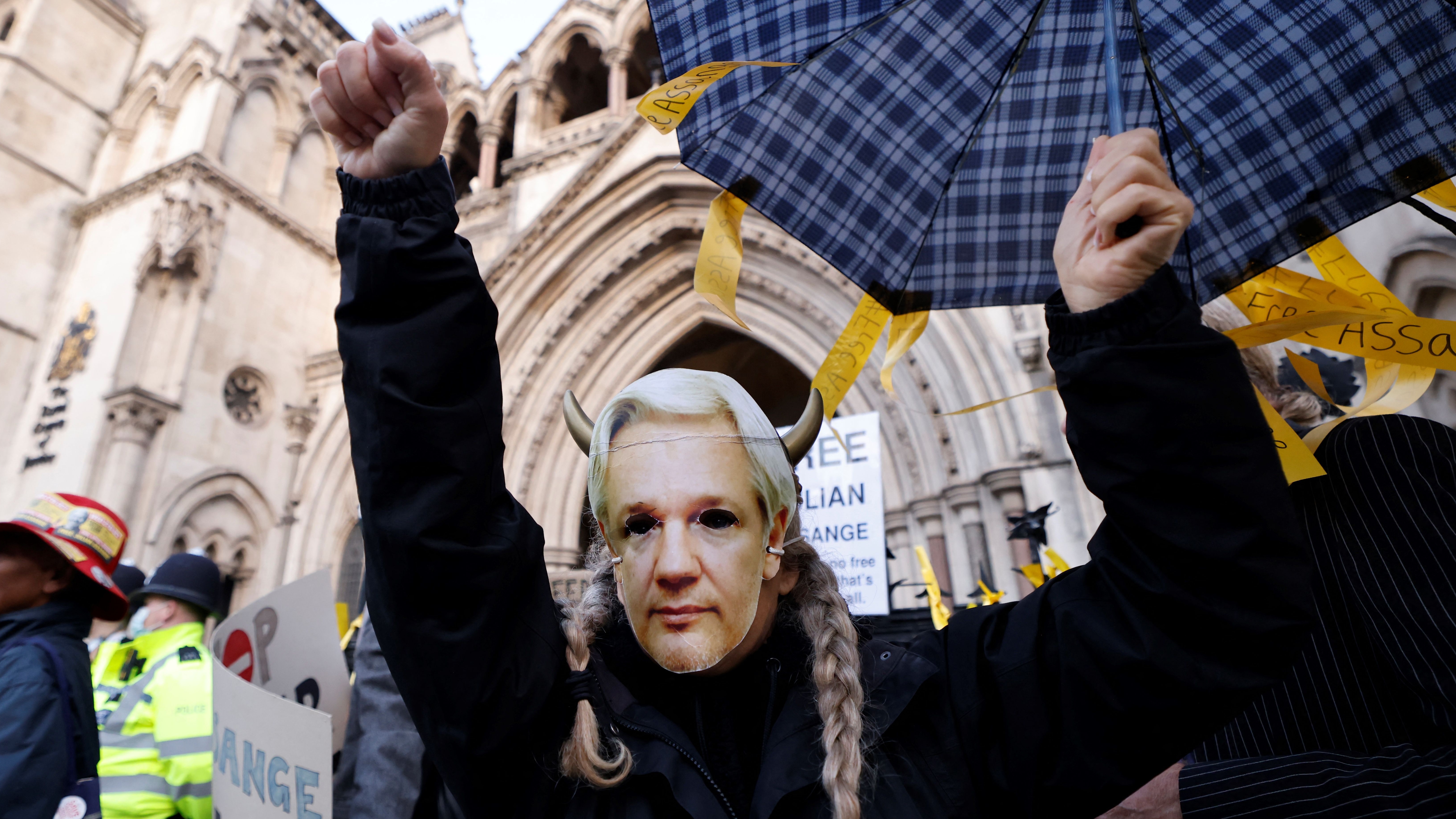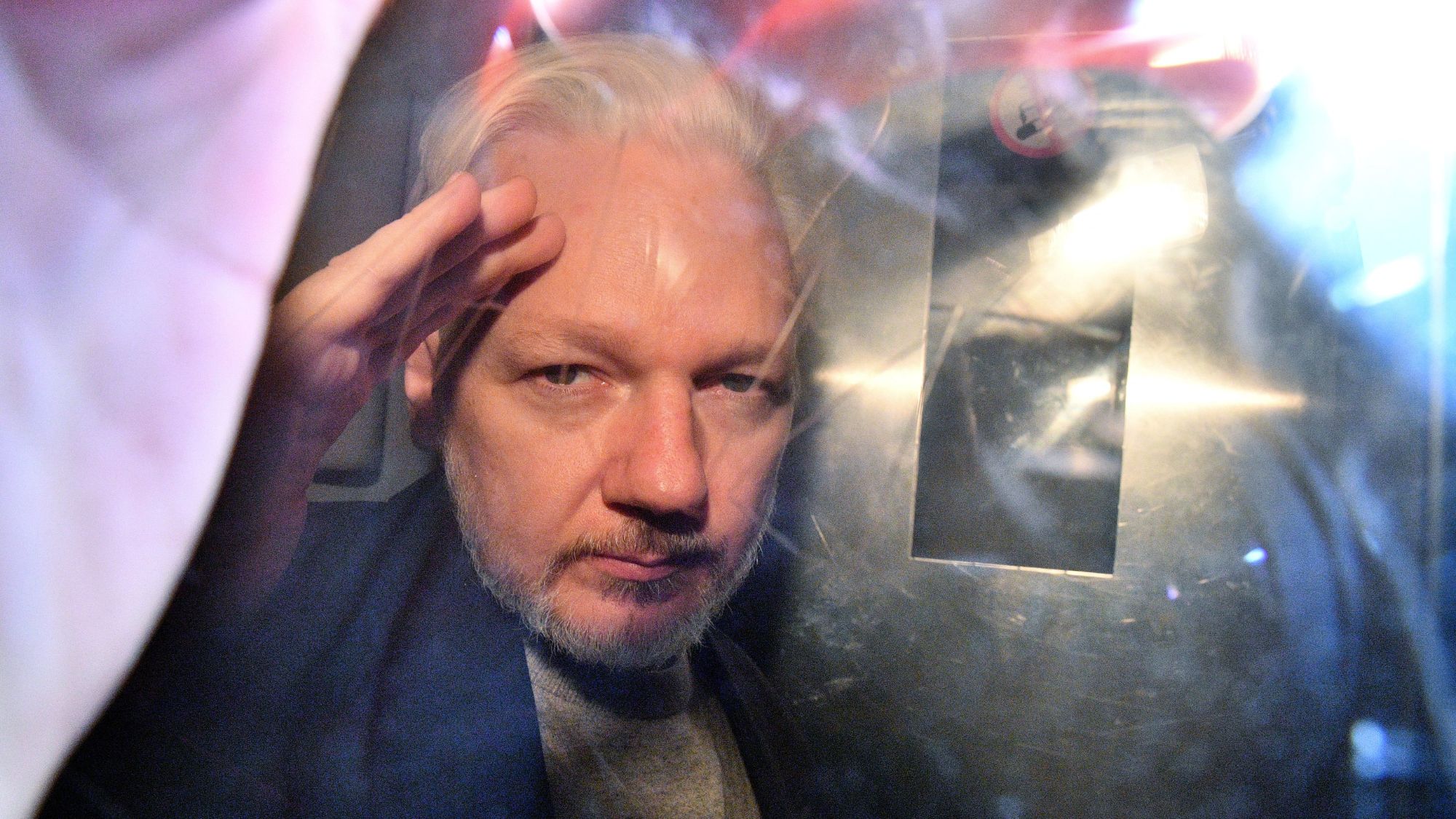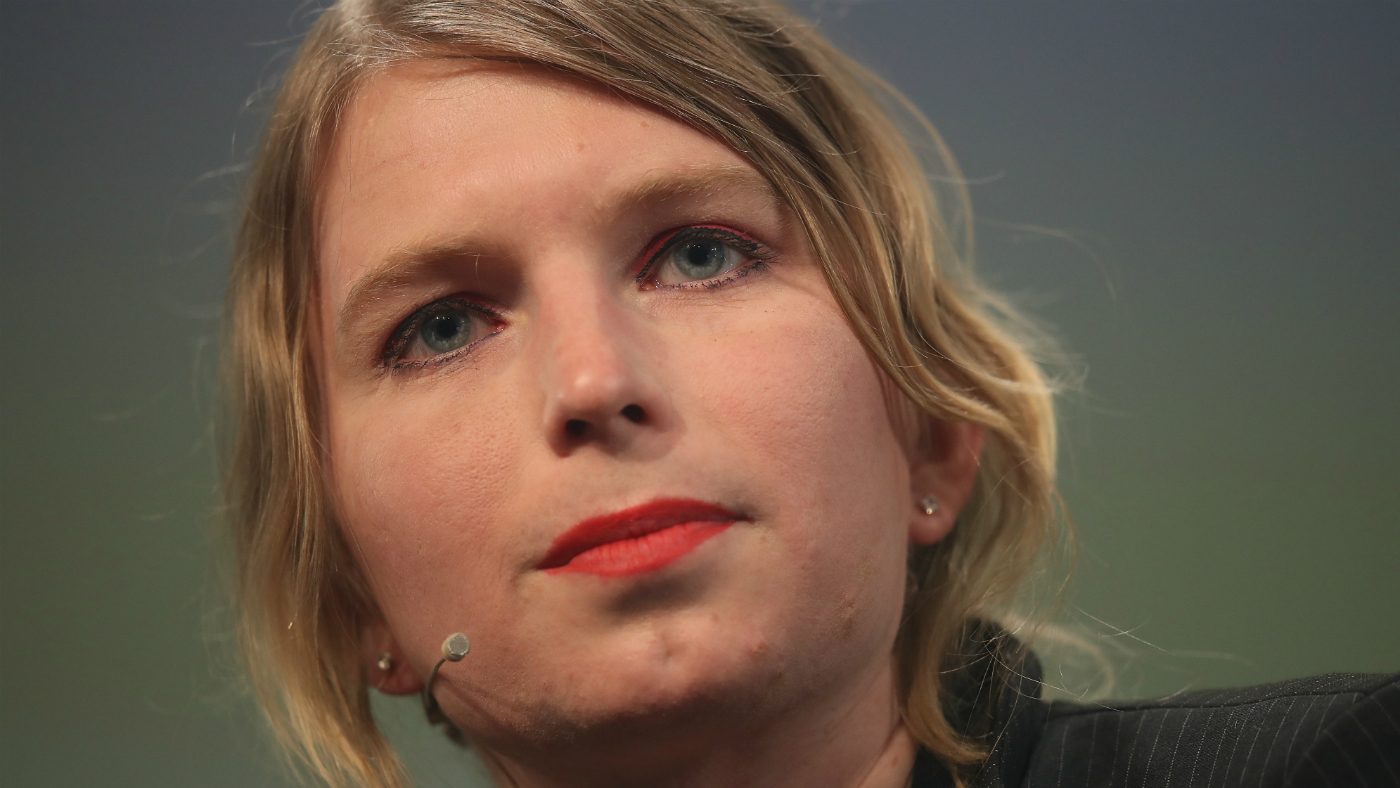Julian Assange: how did WikiLeaks founder get to this point?
Timeline of WikiLeaks founder's legal battles, as UK High Court grants right to appeal US extradition

A free daily email with the biggest news stories of the day – and the best features from TheWeek.com
You are now subscribed
Your newsletter sign-up was successful
Julian Assange has won the right to a full appeal against his extradition to the US, after two High Court judges ruled the US government had not provided sufficient assurances his First Amendment free speech rights would be protected if he was tried for spying.
The US has issued an extradition order for Assange based on 18 charges brought under the 1917 Espionage Act, related to the publication of thousands of classified documents in 2010 and 2011. His legal team has claimed he could face up to 175 years in prison if convicted in the US.
Assange's supporters have presented the long-running legal saga – which has over 12 years taken the Australian hacker from the Ecuadorean embassy to Belmarsh prison – as a "battle for media freedom," reported Federica Marsi for Al Jazeera. Left-leaning politicians past and present, along with major news organisations have condemned the prosecution under an law that has never been used over the publishing of classified information.
The Week
Escape your echo chamber. Get the facts behind the news, plus analysis from multiple perspectives.

Sign up for The Week's Free Newsletters
From our morning news briefing to a weekly Good News Newsletter, get the best of The Week delivered directly to your inbox.
From our morning news briefing to a weekly Good News Newsletter, get the best of The Week delivered directly to your inbox.
Monday's ruling is "the culmination of 13 years of legal battles" said Reuters, but the story of how Assange came to this point goes back even further.
Assange the hacker
In September 1991, at the age of 20, Assange gets his first taste of the long arm of the law when he is caught hacking into the Australian headquarters of Nortel, a Canadian multinational telecommunications corporation.
According to The Sydney Morning Herald, Assange was the "ringleader" of a small organisation of three described by a prosecutor as "looksee" hackers motivated purely by "arrogance and a desire to show off computer skill". When the case finally comes to trial, in December 1996, Assange pleads guilty to 24 charges, but escapes jail due to the perceived absence of malicious or mercenary intent.
In December 2006, Assange launches WikiLeaks. The first document posted on the website is a paper signed by Sheikh Hassan Dahir Aweys of Somalia calling for the execution of government officials by hired hit men.
A free daily email with the biggest news stories of the day – and the best features from TheWeek.com
According to the site, the goal of WikiLeaks is "to bring important news and information to the public ... One of our most important activities is to publish original source material alongside our news stories so readers and historians alike can see evidence of the truth".
In November 2010, WikiLeaks begins to release what it says are 251,287 diplomatic cables acquired from an anonymous source, prompting the US Department of Justice to open an investigation. The source is discovered to be army intelligence analyst Chelsea Manning, who is later convicted under the Espionage Act.
WikiLeaks becomes the subject of international attention when five newspapers - El Pais (Spain), Le Monde (France), Der Spiegel (Germany), The Guardian (UK) and The New York Times (US) - publish 220 of the cables that WikiLeaks received from Manning.
The leaked material reveals "how the US military had killed hundreds of civilians in unreported incidents during the war in Afghanistan", the BBC said, "while leaked Iraq war files showed that 66,000 civilians had been killed and prisoners tortured by Iraqi forces".
Sexual assault allegations
n December 2010, Assange is arrested in London after Sweden issues an international arrest warrant over two allegations – one of rape and the other of molestation – by separate women.
He denies the claims. Assange is "later granted conditional bail at the High Court, bankrolled by his supporters, who pay £240,000", The Guardian reported.
In November 2011, Assange loses his appeal against extradition to Sweden. His supporters say they fear that extradition to Sweden will result in him being extradited to the US to face charges of espionage.
The Obama administration had repeatedly called Assange a "hi-tech terrorist" and expressed an intention to prosecute him when the opportunity arose.
The embassy years
In June 2012, after the UK Supreme Court denies Assange's final appeal against his extradition, he enters the Ecuadorian embassy in London and is granted temporary asylum. The decision "put him in violation of his UK court bail, and it was clear that he'd be arrested by authorities if he ever tried to leave", said Engadget.
In August 2012, Assange makes his first public appearance in two months. Speaking from the balcony of the embassy, he asks the US government to "renounce its witch-hunt" against Wikileaks.
In February 2016, the UN's Working Group on Arbitrary Detention says that the WikiLeaks founder has been arbitrarily detained by UK and Swedish authorities since his arrest in 2010, and that the detention violates his human, civil and political rights.
The UK rejects this charge and says that the panel's decision won't prevent Assange from being arrested if he leaves the embassy.
The following August, Assange and WikiLeaks are implicated in the hacking and leaking of emails between leading Democrats in the 2016 US presidential elections.
According to The Atlantic, Assange also exchanged secret correspondence with Donald Trump Jr, son of the Republican candidate, in the run-up to the election. Despite the alleged link, following the Trump victory the then-attorney general, Jeff Sessions, tells reporters that Assange's arrest remains a "priority".
In 2018, a leaked memo from the Ecuadorian government reveals signs of friction between diplomats and their long-term house guest. Months earlier, Assange’s internet access had been suspended on the grounds that he had been using it to "interfer[e] in other countries' affairs".
The memo lays out a list of rules that he must follow in order to have his internet restored, including a warning "to provide better care of the feline that he shares the embassy with or it may be handed to a refuge", said the BBC.
The memo also implores "Assange and his guests to keep the bathroom clean", according to The Guardian.
Failure to comply with the terms "could lead to the termination of the diplomatic asylum granted by the Ecuadorian state", the letter warns. In response, Assange accuses Ecuador of violating his "fundamental rights and freedoms".
Arrest, extradition and appeals
In April 2019, Assange is arrested for breach of his bail conditions after Ecuador revokes his political asylum and invites Metropolitan Police officers inside its embassy in Knightsbridge. Ecuador's President Lenin Moreno says Assange's asylum has been withdrawn as a result of his repeated violations of international conventions.
On 1 May, a judge sentences Assange to 50 weeks in prison for breaching his bail conditions. On 21 October, Assange appears in court as part of his bid to fight extradition to the US, where he faces 18 counts including conspiracy to hack government computers and violating espionage law. He could be sentenced to up to 175 years in prison if convicted.
Assange's lawyer, Mark Summers, tells the court his client was "gripped" by fear that if extradited to the US, he might be sent to Guantanamo Bay or face other charges that carry the death penalty. He argues that Assange's extradition hearing should be delayed by three months due to the complexity of the case.
However, the judge at Westminster Magistrates Court rejects any delay, with the full extradition hearing set to go ahead in February 2020. Assange is remanded in custody because there were "substantial grounds" for believing he would abscond, said the BBC.
In November 2019, the Swedish authorities drop their case against Assange because too much time had passed since the alleged offences.
After a week of opening arguments, Assange's extradition hearing begins on 24 February 2020. The Guardian reported the next day that his lawyers had claimed the prisoner was "handcuffed 11 times, stripped naked twice and had his case files confiscated after the first day of his extradition hearing".
The case is then pushed back due to the coronavirus pandemic, and in March 2020 Assange is denied bail after claiming he was at risk of catching Covid-19 in Belmarsh prison. The judge says "there are no conditions that allay" the concern that he would again abscond.
A group of MPs, journalists and human rights advocates in Australia call on the government in Canberra to intervene in Assange’s case in June 2020. Weeks later, the US Department of Justice submits a further indictment against Assange, "adding no new charges but expanding on the charge for conspiracy to commit computer intrusion", a group of 40 rights groups say in a letter to the UK's justice secretary, Reporters Without Borders said.
A four-week hearing begins on 7 September 2020, despite Assange's lawyers' attempt to adjourn the case. During the proceedings, the court hears that "plans to poison or kidnap Julian Assange from the Ecuadorian embassy" had been discussed between US intelligence sources and a private security firm, The Guardian reported. The hearing ends on 2 October, with the delivery of the judge’s ruling set for the new year.
In January 2021, a UK judge blocks a request by the US Justice Department to extradite Assange on the grounds of concerns of "mental harm". The possibility that Assange would be detained in "near-solitary confinement in a 'supermax' prison... proved decisive", said Dominic Casciani, BBC home and legal correspondent.
In July 2021, days after Assange turned 50, a High Court official grants the US government permission to appeal the London court's decision. If the appeal succeeds, "Assange won't be held in a supermax jail if extradited and will be allowed to serve prison time in Australia", an unidentified source informed Bloomberg.
In August 2021, lawyers for the US begin their appeal to extradite Assange. They say that the US government has "now given four binding assurances as to how Assange would be treated", the BBC said. These include promises that "it would not impose a highly restrictive form of solitary confinement on Assange before or after trial" and that "Assange could apply to serve a sentence in Australia and the US would agree to that transfer".
In December that year, the High Court ruled Assange could be extradited to the US from the UK, after Lord Chief Justice Lord Burnett said the risk "is in our judgement excluded by the assurances which are offered".
In March 2022 Assange marries his long-term partner, lawyer Stella Moris, inside Belmarsh prison. The couple began their relationship in 2015 and have two children together.
That same month, the Supreme Court agrees Assange's extradition would not be "incompatible with his human rights" and that while in the US "he will be treated appropriately". In June the then-Home Secretary Priti Patel approves his extradition to the US. WikiLeaks confirmed it would appeal the decision and, in a press conference outside the British Embassy in New York, his brother Gabriel Shipton said they would take his appeal to the European Court of Human Rights if not successful in the UK's High Court.
In February 2024 Assange returned to the High Court to ask for permission to appeal. The High Court delayed its ruling until 20 May, asking the US to provide assurances, including that Assange would be able to rely on the constitutional first amendment right to free speech; that his Australian nationality would not count against him; that he would not be sentenced to death if he is later convicted of additional crimes relating to WikiLeaks.
-
 James Van Der Beek obituary: fresh-faced Dawson’s Creek star
James Van Der Beek obituary: fresh-faced Dawson’s Creek starIn The Spotlight Van Der Beek fronted one of the most successful teen dramas of the 90s – but his Dawson fame proved a double-edged sword
-
 Is Andrew’s arrest the end for the monarchy?
Is Andrew’s arrest the end for the monarchy?Today's Big Question The King has distanced the Royal Family from his disgraced brother but a ‘fit of revolutionary disgust’ could still wipe them out
-
 Quiz of The Week: 14 – 20 February
Quiz of The Week: 14 – 20 FebruaryQuiz Have you been paying attention to The Week’s news?
-
 Julian Assange free after agreeing to guilty plea
Julian Assange free after agreeing to guilty pleaSpeed Read Wikileaks founder not expected to serve additional prison time, paving way for return to Australia as a free man
-
 Chelsea Manning released on judge’s order
Chelsea Manning released on judge’s orderSpeed Read Ex-army analyst's legal team says she attempted suicide this week